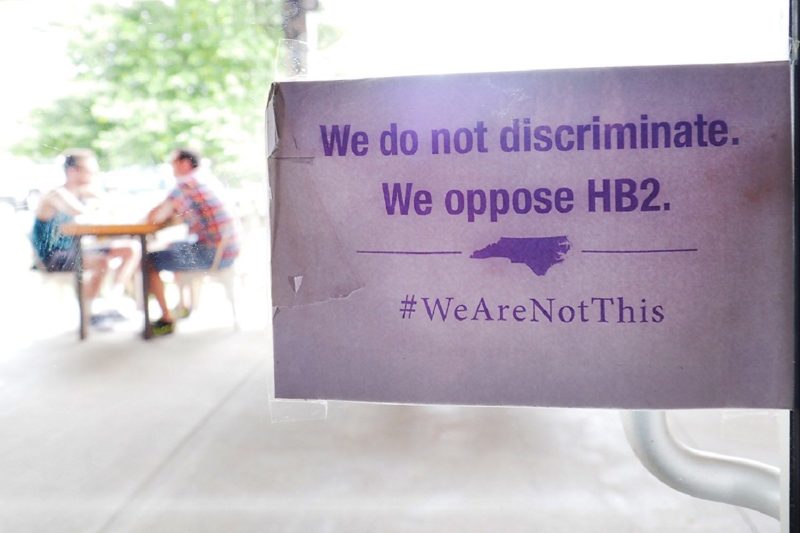North Carolina Republicans Refuse to Repeal ‘State-Sanctioned Discrimination’
"I'm disappointed for the people of North Carolina—the jobs that they may not get,” Governor-elect Roy Cooper said. “I'm disappointed that we haven't yet removed the stain from our reputation around the country and around the world."

North Carolina GOP lawmakers failed Wednesday to follow through on a bipartisan deal to repeal HB 2, the state’s anti-LGBTQ law that bans transgender people from using public restrooms based on their gender identity.
The failure to do away with the discriminatory law may have disastrous consequences for a state that experienced a significant negative economic impact from the law’s passing, as opponents of the measure began to call on Thursday for a national economic boycott of North Carolina.
North Carolinians overwhelmingly support the repeal of HB 2, according to data from the Public Policy Institute. Republican Gov. Pat McCrory’s failed re-election bid has been largely credited to widespread opposition to the anti-LGBTQ law that he enthusiastically endorsed.
A deal to repeal HB 2 appeared to have been brokered between North Carolina Republican lawmakers and Charlotte city officials: State lawmakers would repeal the so-called bathroom bill and city leaders would remove the ordinance that protects LGBTQ people from discriminatory practices. The Charlotte ordinance, which is what prompted state-level Republicans to propose and pass HB 2, was invalidated when the bill passed through the GOP-dominated legislature and McCrory signed it.
After the city council on Monday repealed key parts of the ordinance, Republicans in the state legislature complained that the ordinance had not been fully repealed. In response, the Charlotte city council met Wednesday morning and repealed the entirety of the ordinance.
Nevertheless, Republican lawmakers balked at repealing the law as they had promised. The deal dissolved Wednesday amid increasing partisan acrimony, falling apart after more than nine hours of closed-door negotiations.
SB 4, sponsored by Senate Leader Phil Berger (R-Rockingham), would have repealed the discriminatory law. Republican lawmakers included in the bill a “six-month cooling-off period,” a moratorium on non-discrimination city ordinances like the one passed by Charlotte.
The language of the bill would have prevented municipalities from passing an ordinance “regulating employment practices or regulating public accommodations or access to restrooms, showers, or changing facilities.”
Sen. Jeff Jackson (D-Charlotte) said the inclusion of the moratorium violated the deal that had been brokered, reported WTVD. “This wasn’t the deal,” Jackson said. “This bill breaks this deal. Charlotte would have not repealed its ordinance if this was the deal.”
Berger said the moratorium was included due to Charlotte’s actions earlier in the week, reported WSOC. “I don’t know why they wanted to get cute with it,” Berger said. “The moratorium was not there until we saw what they had done with their repeal.”
The special session ended without a bill being passed.
Berger laid the blame at the feet of incoming Governor-elect Roy Cooper, reported the Charlotte Observer.
Cooper said during a press conference after the special session that Republican lawmakers “refused to live up to their promise” in failing to fully repeal HB 2, reported WTVD.
“I’m disappointed for the people of North Carolina—the jobs that they may not get,” Cooper said. “I’m disappointed that we haven’t yet removed the stain from our reputation around the country and around the world.”
LaWana Mayfield, one of the two Charlotte city council members who voted against the full repeal, said she had voted no on the proposal because she had “no faith” in the Republican-controlled state legislature, reported Raleigh News & Observer.
“You cannot make an honest deal with dishonest people,” Mayfield said.
The ramifications of GOP lawmakers’ failure to repeal the law could be immediate.
William J. Barber II, president of the North Carolina NAACP, said Wednesday that he would ask the national NAACP to call for an economic boycott of North Carolina.
“It puts another form of pressure on our leaders and our leadership to do right,” Barber said while speaking at the Davie Street Presbyterian Church, reported the Charlotte Observer.
The passage of HB 2 has drawn condemnation from businesspeople and has led corporations such as PayPal to cancel expansion plans in Charlotte. At least five states and 21 cities have banned government-funded travel to North Carolina.
The failure to repeal the law could cost the state an estimated $5 billion per year, according to a report from the Williams Institute at the UCLA School of Law.
Chris Brook, legal director of the ACLU of North Carolina, said in a statement that the fight for “equal protection for the entire LGBT community” would continue in the courts.
“State-sanctioned discrimination is unacceptable,” Brook said. “LGBT North Carolinians and millions around the country are anxious to see an end to these dangerous displays of intolerance.”
The ACLU, ACLU of North Carolina, Lambda Legal, and the law firm of Jenner & Block are challenging HB 2 in federal court.
It remains unclear whether action will be taken to repeal the law in the upcoming legislative session. Republicans will once again have large majorities in both legislative chambers, holding a 35-15 advantage in the senate and a 74-46 majority in the house.
The state legislature’s 2017 regular session is scheduled to convene on January 11.
